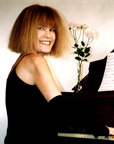|
Jazz Profiles from NPR
Carla Bley
Produced by John Diliberto

|
|
Although she's known as the "Queen of the Avant-garde," pianist and composer Carla Bley never sacrifices swing, creating music that is at once challenging and melodious. Over the course of her 40 year career, she helped to change the role of the big band in jazz.
|
|
 |
Listen to writer Bob Blumenthal, singer and bassist Jack Bruce, and trombonist Gary Valente talk about Carla Bley' music
|
For a jazz composer, Carla's background is as atypical and idiosyncratic as her music. Born and raised in Oakland, California in a fundamentalist Christian household, Carla began playing piano at age 3, encouraged by her musically gifted parents.
Carla's musical education consisted of equal parts classical and church. During her adolescence, while staying the course scripted by her family's religious beliefs, she was drawn towards the "rebellious" reputation of jazz music, sneaking into clubs in the Bay Area to soak up the scene.
 |
|
As a young woman, Carla moved to New York City to be closer to the source of bebop, and received the remainder of her jazz education as a cigarette girl at the notorious Birdland Jazz Club where she met her first husband, pianist Paul Bley (left).
|
 |
Listen to Paul Bley recall how he first met Carla at Birdland
|
After hooking up with Paul Bley, Carla relocated to Los Angeles with him, where his group had a steady gig at the Hillcrest Club, and she tried her hand at composing for the first time. With Paul's encouragement, Carla began writing pieces for his Quintet, including a tune that would become her first recording, "One Plus One."
When saxophonist Ornette Coleman exploded onto the scene, Paul Bley fired his band and hired the young dynamo's quartet as his new backing group. Carla gained exposure to Coleman's revolutionary music, an experience which "changed her life," transforming her approach to composition as she "started writing for no chord changes."
Before long, Carla's "free" compositions were being recorded by trumpeter Art Farmer, clarinetist Jimmy Giuffre, and vibraphonist Gary Burton, among others. Still, Carla lacked confidence in her talent until she earned the recognition of composer George Russell when he recorded her song "Bent Eagle" in 1960.
Among Carla's most inspired, elaborate undertakings was the "sprawling and surreal" opera, 1968's Escalator Over the Hill. Influenced by the late-decade rock concept albums, Carla assembled an unlikely cast of disparate characters for the project, including trumpeter Don Cherry, tenor sax player Gato Barbieri, bassist Charlie Haden, former Frank Zappa keyboardist Don Preston, and even pop singer Linda Ronstadt.
 |
Listen to Carla talk about influence of rock music on Escalator Over the Hill
|
 |
|
Escalator, complete with an esoteric libretto by poet Paul Haines, established Carla's reputation as a daring, satirical, often humorous composer. Despite her "bohemian" image, Carla remains a disciplined artist, composing daily and evolving continually.
|
After 40 years in the business, Carla Bley is still going strong, returning to her roots with one of her 1996 CDs, Carla Bley Big Band Goes to Church (ECM), and on her most recent disk, 4 x 4 (ECM 200).
|